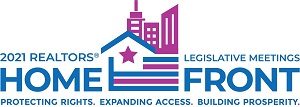Across the country, listings are being scooped up so quickly that there’s little inventory accumulation. Contract signings increased 23.3% year over year in March, according to the National Association of REALTORS® Pending Home Sales Index. Buyer demand has indeed created a hot market, but it’s also putting pressure on agents to help their clients compete amid multiple offers.
Unfortunately, multiple-offer situations can lead to some bumps in the road, said NAR Associate Counsel Deanne Rymarowicz during the Idea Exchange Council for Brokers Forum at the virtual REALTORS® Legislative Meetings on Wednesday. “But if you adhere to some key principles and risk management tips, you can help avoid complaints and fair housing issues while helping both the seller and the buyer understand their offers,” she said.

Here are four key areas of risk real estate professionals should be mindful of.
1. Love letters: This includes any communication that accompanies an offer from the buyer to the seller, such as a letter, video, or photos. The problem is these letters often innocently include personal information that reveals a prohibited basis for discrimination, including race, color, religion, national origin, sex, familial status, and disability, Rymarowicz said. For example, if a letter says, “We can see our family celebrating Christmas around the fireplace,” or, “The wide hallways can accommodate my wheelchair,” there are potential fair housing issues, she said.
Fair housing laws are in place to ensure anyone who’s qualified can purchase real estate. A love letter that includes personal pieces of information can trigger implicate bias in the seller, and they may end up choosing a buyer because of that bias, Rymarowicz warned. To avoid a fair housing lawsuit against the seller and listing agent, the safest course of action, Rymarowicz said, is to explain the pitfalls to the buyer and seller. “If your client absolutely insists on writing a love letter because their neighbor did it, their cousin did it, and they want to do it too, remind the buyer to stick to objective criteria and not mention any of those protected bases,” she said. If you’re working with the seller, remind them they have the option to not accept or read love letters.
But sometimes a buyer will take action without the agent even knowing, by contacting the sellers on social media or putting a letter in the mail, Rymarowicz said. “They feel the need to do whatever’s necessary to find the home of their dreams,” she said. So, it’s important that real estate professionals educate them on the potential risk.
2. Escalation clauses: This is a clause in the offer that states if a competing bona fide offer is made on the property, the buyer’s offer will automatically increase by a certain dollar amount over the competing offer up to a maximum. “These can get very messy very quickly,” Rymarowicz said.
Here are some issues that buyer’s agents should consider: If you use an escalation clause, you’ve already tipped your hand by revealing what your top dollar amount is and the sellers may shortcut the process and give you a counteroffer for that top dollar, she said. Some escalation clauses request a copy of the other bona fide offer, so they have proof, but that can violate the law in some states where the buyer’s terms are kept confidential.
Many state and local REALTOR® associations are creating forms with escalation clause language. It’s also best to get your broker or legal counsel involved if your buyer wants to write in an escalation clause, Rymarowicz said.
3. Waiving contingencies: “In an effort to make their offer the most attractive possible in a multiple-offer situation, some buyers are waiving absolutely every contingency they can think of,” Rymarowicz said. But there are some things that aren’t waivable, such as the lead-based paint disclosure, which is a federal disclosure. Some states may have non-waivable disclosures, such as homeowner association disclosure packets.
Some buyers are waiving the appraisal contingency and sellers may require proof of funds to cover any gap in the appraisal. It’s best to check with your local or state association to see if they have an appraisal addendum and language that addresses the situation if the appraisal does not meet the agreed-upon purchase price, Rymarowicz said.
Even if the buyer is waiving an inspection, as a licensed agent and REALTOR®, your duties under state law and the REALTOR® Code of Ethics, are to make sure disclosures of known material facts are still presented. “Those do not go away; those still must be adhered to,” she said.
Work with your broker or legal counsel to create an addendum that acknowledges you’ve educated the buyer of their rights and the benefits of inspections, and that they’re knowingly waiving those, Rymarowicz suggested. This protects you in advance if a client comes back several months later and says, “Hey, I didn’t know the roof was nearly caving it. Why didn’t you tell me to get that inspected?”
4. Preparing sellers: Listing agents should let sellers know that multiple offers are possible and have a frank discussion about what’s important to them. Have a system in place for presenting multiple offers, and know your state laws regarding timelines for presenting offers and what may be disclosed to the other parties involved in a multiple offer situation.
Article 1 of the Code of Ethics requires REALTORS® to protect and promote the interest of their clients while treating all parties honestly. The REALTOR®, with the seller’s approval, must disclose the existence of other offers when asked by a cooperating broker or buyer, Rymarowicz said.
Follow all of REALTOR Magazine's coverage of the REALTORS Legislative Meetings at magazine.realtor/live.

Contributing Editor
Erica Christoffer is a multimedia journalist and contributing editor with REALTOR® Magazine. In addition to writing print and online articles, Erica oversees the magazine's Broker to Broker content, co-manages the 30 Under 30 program, and manages the YPN Lounge. Connect with her via email: echristoffer@nar.realtor.













